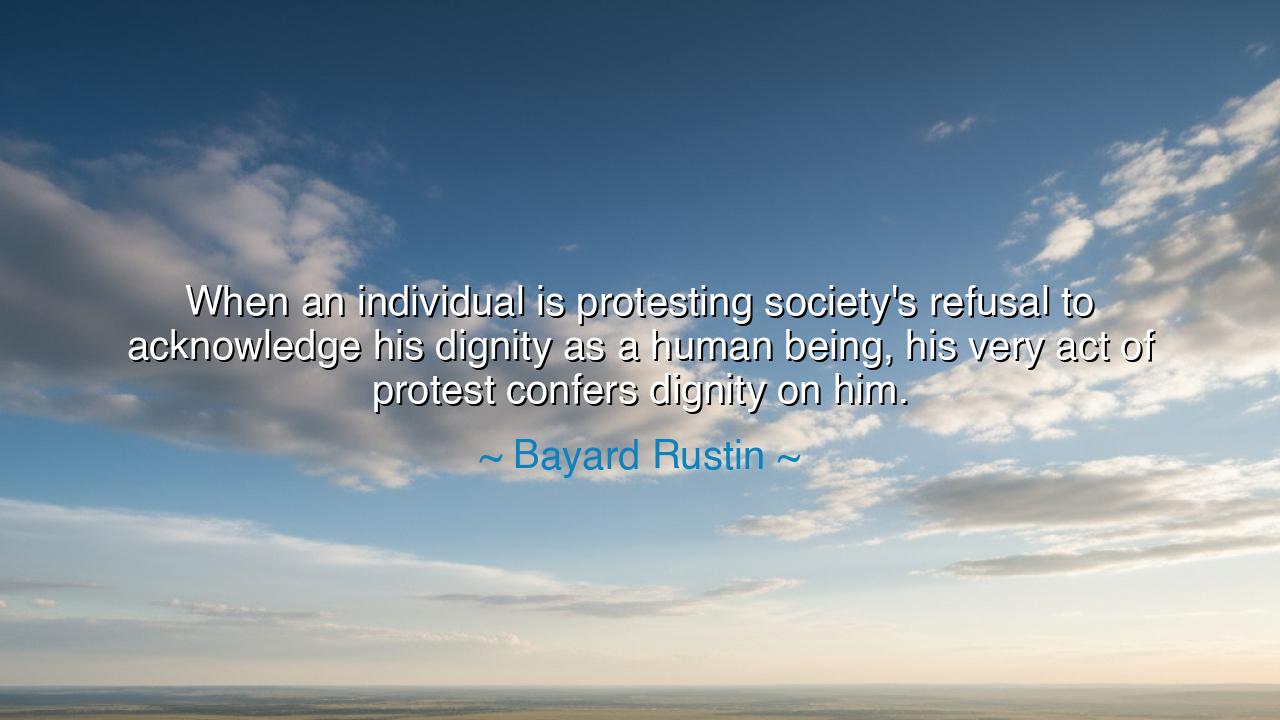
When an individual is protesting society's refusal to acknowledge
When an individual is protesting society's refusal to acknowledge his dignity as a human being, his very act of protest confers dignity on him.






Hear these words of Bayard Rustin, a man who labored in the shadows but whose wisdom shines like fire: “When an individual is protesting society’s refusal to acknowledge his dignity as a human being, his very act of protest confers dignity on him.” These are not words spoken lightly, but hammered out upon the anvil of struggle. They remind us that dignity is not bestowed by rulers, nor granted as a favor by the powerful—it is claimed, it is lived, it is revealed through the courage of those who will not be silent when injustice reigns.
For what is protest, if not the voice of the voiceless refusing to vanish into silence? When the mighty close their ears and the structures of society deny humanity, the lone cry of resistance becomes more than defiance—it becomes a declaration of existence. It says, “You may strip me of wealth, you may deny me recognition, but you cannot take my dignity, for by standing, I already possess it.” The act of rising, even alone, transforms the weak into the strong, the invisible into the undeniable.
Consider the tale of Rosa Parks, a seamstress weary after a long day, who in 1955 refused to give up her seat to a white man on a bus in Montgomery. By the laws of the time, she was to be humiliated, diminished, cast aside. Yet in that moment of stillness, her act of protest became a flame. Her dignity was not crushed but magnified. She gave voice to the truth Rustin spoke: when one resists society’s refusal to see their humanity, the very resistance itself radiates that humanity. Her quiet courage ignited a movement that shook the foundations of segregation.
Nor is this truth bound to one age or one people. Think of the dissidents in Soviet lands, who stood before tanks in defiance, or the lone man in Tiananmen Square, whose body was fragile but whose dignity was immovable. Such moments echo across time, teaching us that the power of protest does not rest in victory alone, but in the unshakable act of standing, even when defeat seems certain. For the act itself says: “I am human. I will be treated as human.”
The wisdom of Rustin’s words flows deeper still, for he reminds us that dignity is not something society may bestow like a gift upon the deserving. No! That which can be given can also be taken, but true dignity resides within, unbreakable, awaiting only the courage to be claimed. Thus, the act of protest is not only a call to justice—it is also a sacrament, a moment where the protester affirms their sacred worth before heaven and earth alike.
The lesson for us is plain: do not wait for society to recognize your value, nor for the powerful to hand you permission to exist. If you are denied, speak; if you are silenced, rise; if you are diminished, assert your place. Each act of resistance, no matter how small, clothes you in the armor of dignity that no enemy can remove. You do not protest because you lack worth—you protest because your worth is eternal, and the world must be reminded of it.
Therefore, O seeker of truth, let your actions be these: when you see injustice, do not shrink back into fear. Join your voice to the chorus of those who rise. If your own life places you in the shadows, let even your whisper be an act of protest. And when you doubt your strength, remember this teaching: every step you take in defiance of oppression, every stand you make for what is right, already crowns you with the dignity you seek. For history does not remember the silence of the oppressed—it remembers the courage of those who refused to bow.






AAdministratorAdministrator
Welcome, honored guests. Please leave a comment, we will respond soon